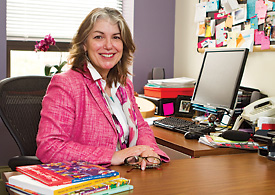Carol Stepanchuk took interest in Chinese culture in high school when she saw a reproduction of a Chinese scroll painting in an art book. Living in a small New England town with little exposure to Asian art and culture, she found Chinese script and imagery fascinating and beautiful.
“The interest in Chinese was visual in the beginning, and just wanting to understand further,” Stepanchuk says.

Photo by Daryl Marshke, U-M Photo Services.
Motivated by this fascination, Stepanchuk dedicated herself to learning to read Chinese. She studied the language at University of Massachusetts, Amherst, as an undergraduate, and received master’s in both Asian studies from University of California, Berkeley, and Museum Studies John F. Kennedy University.
Working as community outreach coordinator in the Center for Chinese Studies, Stepanchuk uses her knowledge of Chinese culture to help the center bring it to the community.
She plans university and community events, and creates educational materials on Chinese culture for schools and programs in the area. She also brings her background in global arts to the Stearns Collection and acts as an adviser to students in the center’s two-year master’s program.
“One of the greatest benefits of my job is being able to stay contemporary with Chinese culture based on all that transpires within the center,” Stepanchuk says. “You learn something new every day.”
This fall the Center for Chinese Studies will host its 50-year anniversary celebration. Stepanchuk is working to connect School of Art & Design faculty with traditional kite-makers in China. They will do apprenticeships abroad and bring the art of kite-making back to U-M campus so the center can host a student and community competition as a kick-off to a fall series of lectures and panels on China.
After graduating from UMass, Stepanchuk traveled to the city of Lukang, Taiwan. While there she worked at a folk art museum, and on the side, studied religious festivals, since the city is well known for its high concentration of temples and strong religious observances.
“I remember when I was in Lukang someone gave me a calendar of the religious observances for each day, and it was like a key to unlock what was going on,” Stepanchuk says. “If you understood certain deities, you began to understand when the festivals would occur.”
While attending Berkeley, Stepanchuk continued her exploration of Chinese religion and festivals. She traveled to Taiwan to research temple practices and material culture connected with religious cults of the afterlife. Around the same time, through the Museum Studies program, she visited Northern California touring historic Chinese temples built by the first wave of Chinese immigrants.
A curator said no one had written about the religious history of the area, so Stepanchuk took the opportunity to visit these temples and compile a history of their art and architecture, as well as an inventory of objects within.
Stepanchuk says that this experience, as well as her previous one in Lukang, laid a strong foundation for her understanding of Chinese religion and festivals that inspired her to write a book on the subject for the general public.
This opportunity came to Stepanchuk just after grad school, while she worked at Xanadu Gallery in San Francisco. An editor from a Chinese publishing company came in one day looking for someone familiar with Chinese culture, and Stepanchuk was asked to come over and talk with him.
Though their introduction was unexpected, they immediately hit it off and eventually formed a partnership in writing the first of Stepanchuk’s three books, an introduction to Chinese festivals titled “Moon Cakes and Hungry Ghosts.”
Stepanchuk says that this chance encounter, and the subsequent partnership that formed, reminds her of a saying that claims success in life.
“Certainly chance meetings influence the course of your life and the work that you do,” Stepanchuk says. “Luck very much affects the path that you follow, but to take advantage of the opportunities requires perseverance and imagination.”
The weekly Spotlight features staff members at the university. To nominate a candidate, please contact the Record staff at [email protected].

